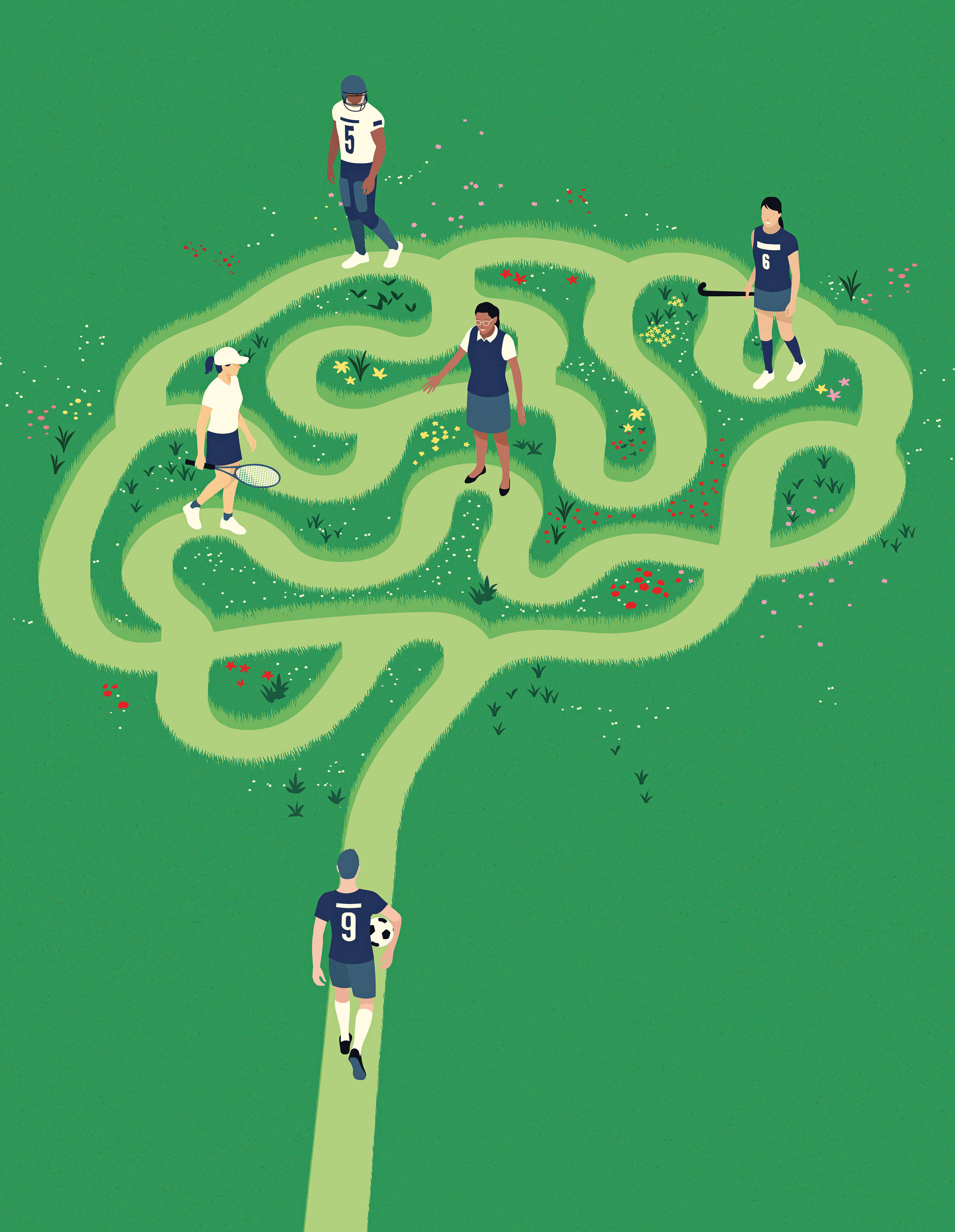
A Game Plan for Well-Being
Monmouth’s holistic approach to supporting the unique mental health needs of its student-athletes is designed to help them succeed on and off the field.
Alyssa Ercolino ’17, ’22M understands the student-athlete grind as well as anyone. A three-time All-MAAC forward for the Monmouth field hockey team from 2013 to 2016, she started 78 games and finished her Hawks career among program leaders for goals and assists. Two years after graduation, she was back on campus as an assistant coach, where she spent five seasons helping young women who were balancing the same demands of classwork, practice, and everything else that she was juggling just a few years earlier.
In the fall of 2022, Ercolino began a new role for which her prior experience was the ideal preparation: She’s the University’s first full-time sports behavioral health specialist. The new position is part of Monmouth’s response to the unique mental health needs of student-athletes, a challenge of which there is growing awareness at institutions across the nation.
“It’s the time commitment spent on your sport—not just the 20 hours of practice a week the NCAA allows, but time spent thinking about and preparing for your sport, plus the impact of travel and missing classes,” Ercolino says. “It all takes a toll.”
Accounting for that toll, and helping student-athletes not just get by but thrive in the face of it, is the focus of Ercolino and her colleagues in Monmouth’s student-athlete development office. Along with sports nutritionist Ellie Meyers and sports psychology consultant Pete Economou, Ph.D., Ercolino is tasked with giving nearly 600 Hawks competing in 24 varsity sports the tools they need to thrive.
Jennifer Sansevero, Monmouth’s acting director of athletics, says such a holistic approach to athlete wellness is essential to Monmouth’s on-field success.
“I’ve been in this business for 15 years, and these issues weren’t part of the recruiting conversations in the past. They definitely are now,” Sansevero says. “Our student-athletes are very vocal about the need for support in this area, and it is a point of emphasis for our department.”
The numbers show just how much of a need there is. Ercolino, who completed her master’s degree in clinical mental health counseling at Monmouth, says more than 100 student-athletes contacted her in her first three semesters in the role. Many are looking for help with issues specifically related to their sport, while others have questions about their broader life outside athletics. Of course, Ercolino says, those areas often overlap: “We hear a lot about performance anxiety. Well, take away the word ‘performance,’ and it’s just anxiety.”
It’s in her ability to relate to the challenges facing student-athletes that Ercolino’s background is invaluable. “Being integrated in athletics, I understand the environment and the culture,” she says, adding that she often heads out to team practices to observe and connect with athletes on their turf. Much of her work is focused on improving performance, through everything from mindfulness practice to establishing pre-performance routines. But, as Sansevero emphasizes, the challenges faced by student-athletes have implications well beyond their sports.
“We’re already trying to give them a skill set for how to perform from an X’s and O’s standpoint, an academic skill set, and preparing for whatever they chose to be in their careers,” Sansevero says. “Now, how do we give them a skill set for managing through crisis, managing through stress, or managing through injuries? And how do they manage after they’re done with their sport, when being a student-athlete has been a big part of their identity?”
Mindful that Monmouth’s student-athletes are students first, Ercolino’s office collaborates with and refers some students to the University’s counseling & prevention services office.
Regardless of whether they’re struggling with time management; the pressure of expectations; or any of the other stressors faced by multitasking, high-achieving young adults, the goal is to help them emerge unscathed. As Sansevero says, “We’ve tried really hard to eliminate the stigma and let student-athletes know it’s OK not to be OK.”